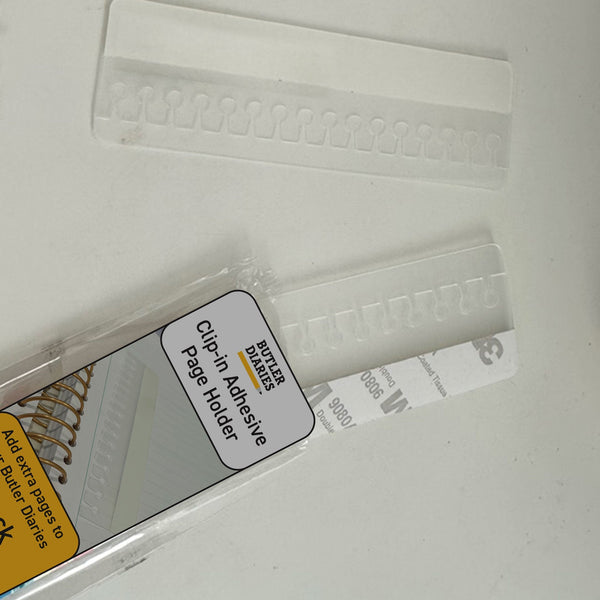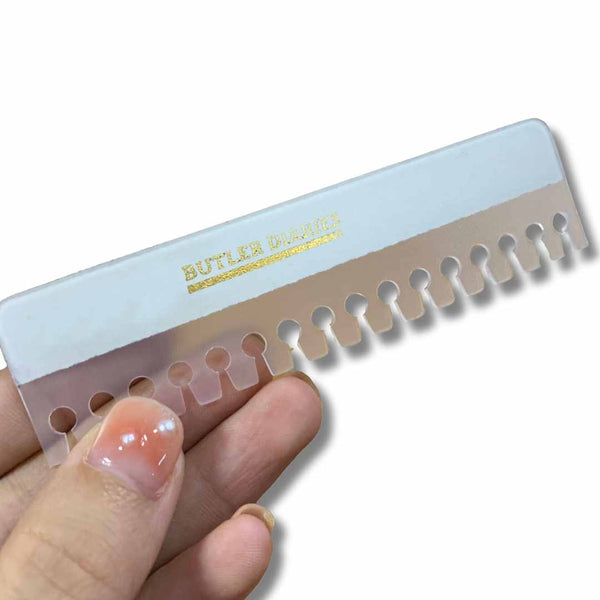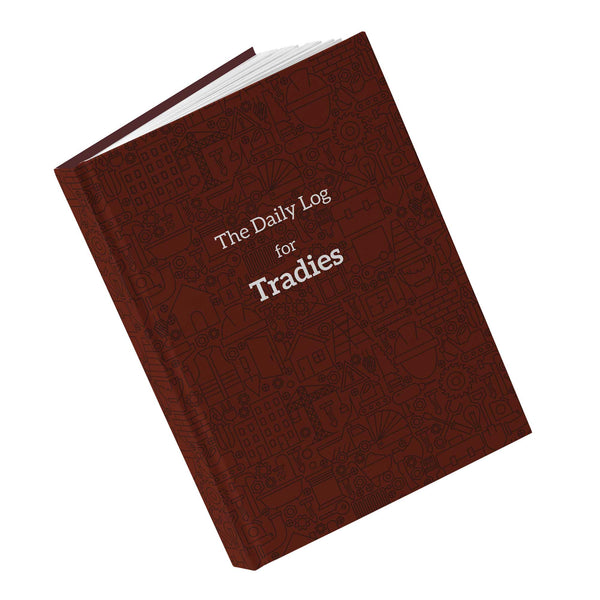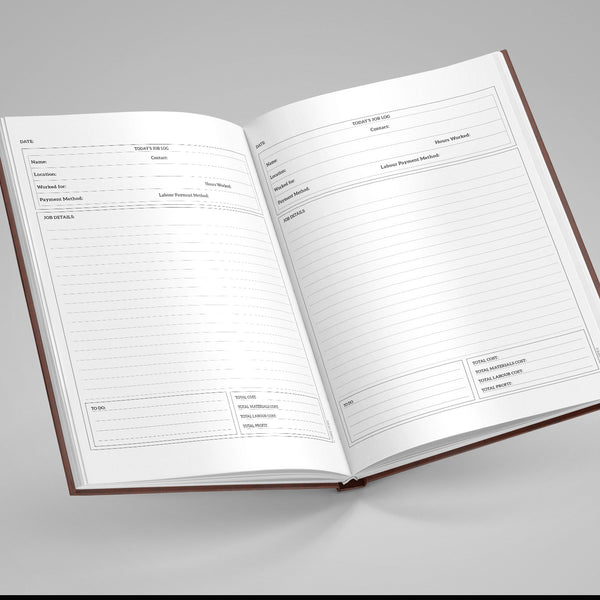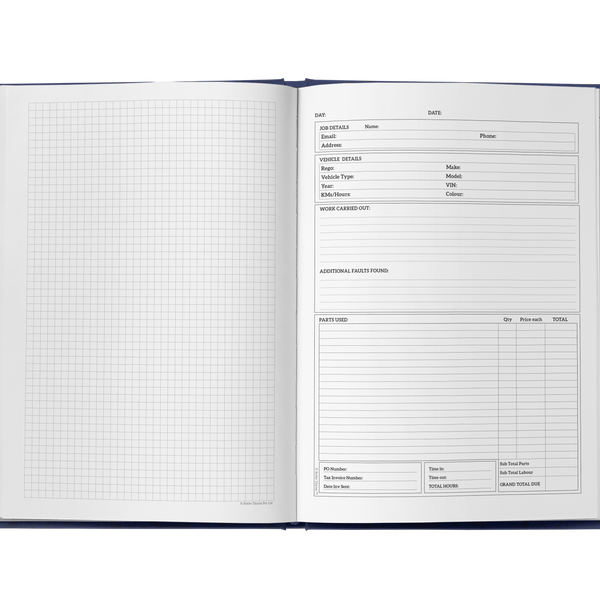Let's be honest - managing a busy schedule as a tradie can be an absolute nightmare. Whether you're a sparkie, plumber, chippy, or site supervisor, keeping track of everything without losing your mind is bloody hard work.
One day you're running late to three different jobs, the next you're double-booked and explaining to cranky clients why you can't be in two places at once. Sound familiar?
Here's the thing though - you don't need some fancy digital system or expensive software. What you need is something reliable that won't let you down when your phone dies or you're in a dead zone. That's where the Construction Diary comes in.
Here's how to use it to get your life back and actually finish work at a decent hour:
1. Plan Your Week Before It Goes Sideways
Sunday arvo - grab a coffee and spend 20 minutes mapping out your week in your Construction Diary. I know, I know - Sundays are for the footy and a few beers. But trust me on this one.
Look at what's coming up and be realistic about travel time. If you've got a job in the city followed by one in the outer suburbs, you're not teleporting between them. Factor in traffic, especially around major cities where it's always a nightmare.
This isn't about being perfect - it's about not setting yourself up to fail before Monday even starts.
Pro tip: Use different coloured pens for different types of work. Emergency calls in red, maintenance in blue, new installs in green. You'll quickly see if your week's balanced or if you're in for a world of pain.
2. Work Out What Actually Matters
Not all jobs are created equal, mate. Some are urgent, some can wait, and some you probably shouldn't have said yes to in the first place.
Here's a simple system that actually works:
- Must-do today: Emergency repairs, safety issues, jobs with deadlines
- Important but not urgent: Regular maintenance, follow-up quotes
- When you've got time: Admin stuff, supply runs, cleaning the ute
- Get someone else to do it: Anything your apprentice or subbie can handle
Write these priorities in your diary and stick to them. Don't let that "quick favour" for a mate derail your whole day.
3. Make Lists That Actually Help
For bigger jobs, break everything down in your Construction Diary. Not because you're forgetful, but because ticking things off feels bloody good and keeps you on track.
Plus, detailed lists help you:
- Not forget the important stuff - like turning the power back on
- Show clients what you've done - they love seeing the work itemised
- Cover compliance - documented proof you followed safety procedures
- Bill accurately - no more forgetting to charge for extras
- Train your apprentice - they can see the proper work sequence
Keep template checklists for your common jobs. Every sparkie should have a standard list for new outlet installs, every plumber for bathroom renos. Saves time and nothing gets missed.
4. Actually Take Breaks (You're Not Superhuman)
I get it - there's always more work, and more work means more money. But running yourself into the ground helps nobody.
Schedule proper breaks in your diary:
- Quick breaks between jobs to reset your head
- Lunch away from the job site - even if it's just sitting in your ute
- Days off - your family wants to see you occasionally
- Time for training - new skills = better jobs = more money
A knackered tradie makes mistakes. Mistakes cost money and can be dangerous. Take the bloody break.
5. Use Your Daily Pages for the Real Stuff
The daily section in your diary isn't just for appointments. Use it for everything that matters:
- Weather conditions - matters for concrete, painting, roofing
- What materials you used - helps with accurate costing
- Start and finish times - proves how long jobs actually take
- Client conversations - what they said about changes or extras
- Equipment issues - note anything that needs fixing
- Safety stuff - document any near misses or concerns
These notes save your butt when clients get selective memory about what they agreed to. For even more detailed tracking, pair your main diary with the Daily Log - gives you heaps more space for documentation.
6. Actually Look at What Went Right (and Wrong)
Friday arvo when you're packing up - spend 10 minutes reviewing your week. What worked? What was a disaster? What would you do differently?
Ask yourself:
- Did I estimate job times accurately? (Probably not, we all suck at this)
- Were there any dramas with clients? (And how can I avoid them next time?)
- Which jobs made good money? (Do more of these)
- What slowed me down? (Fix this stuff)
- Am I actually making progress? (Or just staying busy?)
This isn't about beating yourself up - it's about getting better each week. The tradies who do this review consistently are the ones who end up running successful businesses instead of just surviving.
7. Get Your Crew on the Same Page
If you've got a team, everyone needs to know what's happening. Use your Construction Diary to run proper morning briefings.
Cover the basics:
- Who's doing what today - no confusion, no excuses
- Safety briefing - what hazards to watch for
- Quality expectations - what good looks like
- Any client-specific requirements - they want boots off, whatever
- When to check in - regular updates on complex jobs
Get everyone their own diary or at least use page holders to keep important info visible during briefings.
8. Plan for the Seasons
Smart tradies think beyond next week. Use your diary to plan for the year ahead:
- Summer: Aircon work goes crazy, pool jobs, outdoor construction
- Autumn: Roof repairs before winter, garden work, general maintenance
- Winter: Indoor renos, heating installs, equipment servicing
- Spring: Everything kicks off again, pre-summer prep work
Planning ahead means you're not scrambling for work during quiet periods and you're not turning down good jobs during busy times.
Different Trades, Same Problems
Every trade has its own headaches:
- Sparkies: Coordinating with other trades and inspections - consider the Daily Log for Tradies for extra technical tracking
- Plumbers: Emergency calls stuffing up your planned work
- Builders: Managing subbies who all want to work at the same time
- Landscapers: Weather making your schedule look like a joke
The Construction Diary works for all of them because good organisation is good organisation, regardless of what tools you're swinging.
Keep It Simple and Useful
Look, you don't need a PhD in project management. You need a system that:
- Works when your phone's dead
- Doesn't crash or need updates
- Fits in your ute or toolbox
- Actually helps you get organised
- Makes you look professional to clients
The leather notepad is perfect for quick client notes, while your main diary handles the heavy lifting.
The Bottom Line
Tradies who get their scheduling sorted report:
- Getting home at a reasonable hour most nights
- Less stress and fewer arguments with the missus
- Clients who actually respect their time
- Better cash flow through efficient job management
- Time to actually grow their business instead of just surviving
It's not rocket science, but it works. The trick is actually doing it consistently, not just when things get crazy.
Ready to sort your schedule once and for all? Grab your Construction Diary and start planning like a pro. Your future self will thank you for it.






